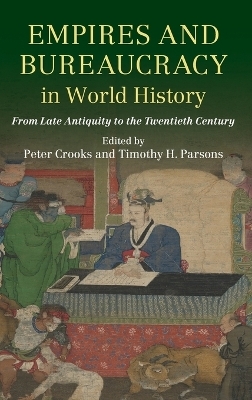
Empires and Bureaucracy in World History
Cambridge University Press (Verlag)
978-1-107-16603-5 (ISBN)
How did empires rule different peoples across vast expanses of space and time? And how did small numbers of imperial bureaucrats govern large numbers of subordinated peoples? Empires and Bureaucracy in World History seeks answers to these fundamental problems in imperial studies by exploring the power and limits of bureaucracy. The book is pioneering in bringing together historians of antiquity and the Middle Ages with scholars of post-medieval European empires, while a genuinely world-historical perspective is provided by chapters on China, the Incas and the Ottomans. The editors identify a paradox in how bureaucracy operated on the scale of empires and so help explain why some empires endured for centuries while, in the contemporary world, empires fail almost before they begin. By adopting a cross-chronological and world-historical approach, the book challenges the abiding association of bureaucratic rationality with 'modernity' and the so-called 'Rise of the West'.
Peter Crooks is Lecturer in Medieval History at Trinity College, Dublin. His primary research interest is in Ireland in the period 1171–1541 and, arising from that, in the wider 'English world' or 'Plantagenet empire' of which Ireland formed an important part. He is editor of Government, War and Society in Medieval Ireland (2008) and, with David Green and W. Mark Ormrod, The Plantagenet Empire, 1259–1453. He is also principal editor of 'Circle' (https://chancery.tcd.ie/), a reconstruction of the Irish chancery rolls destroyed in the 1922 fire at the Public Record Office, Dublin. His articles have appeared in Past and Present and the English Historical Review. Timothy H. Parsons holds a joint appointment as a Professor of African History in the history department and the African and African–American Studies Program at Washington University, St Louis. His publications include The Second British Empire: In the Crucible of the Twentieth Century (2014), The Rule of Empires: Those Who Built Them, Those Who Endured Them, and Why They Always Fall (2010), Race, Resistance and the Boy Scout Movement in British Colonial Africa (2004), The 1964 Army Mutinies and the Making of Modern East Africa (2003) and The African Rank-and-File: Social Implications of Colonial Service in the King's African Rifles, 1902–1964 (1999).
Part I. Introduction: 1. Empires, bureaucracy and the paradox of power Peter Crooks and Timothy H. Parsons; Part II. Empires and Bureaucracy in World-Historical Perspective: 2. China as a contrasting case: bureaucracy and empire in Song China Patricia Ebrey; 3. Conflict and cooperation between Arab rulers and Persian administrators in the formative period of Islamdom, c.600–950 CE I. T. Kristó-Nagy; 4. Bureaucracy without alphabetic writing: governing the Inca empire, c.1438–1532 Chris Given-Wilson; 5. The Ottoman empire (1299–1923): the bureaucratization of patrimonial authority Karen Barkey; Part III. From Late Antiquity to the Middle Ages: 6. 'The late Roman empire was before all things a bureaucratic state.' Michael Whitby; 7. Bureaucracies, elites and clans: the case of Byzantium, c.600–1100 John Haldon; 8. Charlemagne and Carolingian military administration Bernard S. Bachrach; 9. Bureaucracy, the English state and the crisis of the Angevin empire, 1199–1205 John Gillingham; 10. The parchment imperialists: texts, scribes, and the medieval western Empire, c.1250–c.1440 Len Scales; 11. Before Humpty Dumpty: the first English empire and the brittleness of bureaucracy, 1259–1453 Peter Crooks; Part IV. From the Age of European Expansion to the End of Empires: 12. Magistrates to administrators, composite monarchy to fiscal-military empire: empire and bureaucracy in the Spanish monarchy, c.1492–1825 Christopher Storrs; 13. Britain's overseas empire before 1780: overwhelmingly successful and bureaucratically challenged Jack P. Greene; 14. 'Les enfants du siècle': an empire of young professionals and the creation of bureaucratic, imperial ethos in Napoleonic Europe Michael Broers; 15. Bureaucracy, power and violence in colonial India: the role of Indian subalterns Deana Heath; 16. From chief to technocrat: labour and colonial authority in post-World War II Africa Frederick Cooper; 17. The unintended consequences of bureaucratic 'modernization' in post-World War II British Africa Timothy H. Parsons; Part V. Afterword: 18. Empires and bureaucracy: means of appropriation and media of communication Sam Whimster.
| Erscheinungsdatum | 10.08.2016 |
|---|---|
| Zusatzinfo | 4 Tables, black and white; 17 Maps; 5 Halftones, black and white; 3 Line drawings, black and white |
| Verlagsort | Cambridge |
| Sprache | englisch |
| Maße | 158 x 235 mm |
| Gewicht | 890 g |
| Themenwelt | Geisteswissenschaften ► Geschichte ► Allgemeine Geschichte |
| Geschichte ► Teilgebiete der Geschichte ► Wirtschaftsgeschichte | |
| ISBN-10 | 1-107-16603-9 / 1107166039 |
| ISBN-13 | 978-1-107-16603-5 / 9781107166035 |
| Zustand | Neuware |
| Haben Sie eine Frage zum Produkt? |
aus dem Bereich


